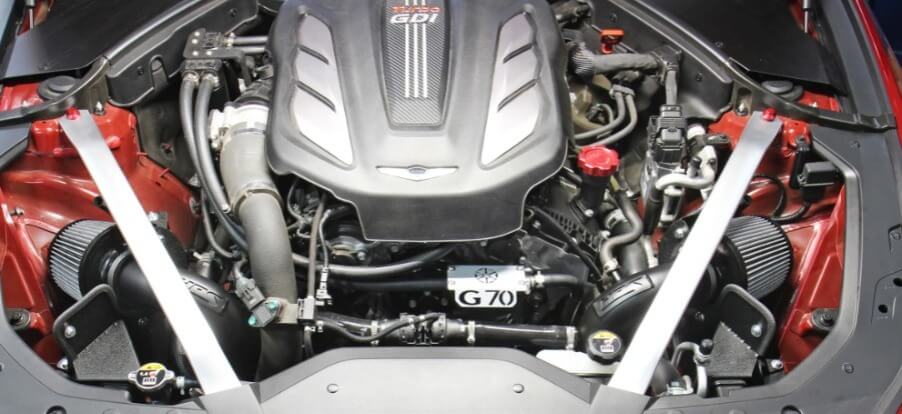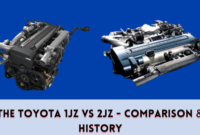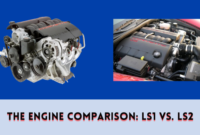The Top 5 Genesis G70 Performance Enhancements. The Gensis G70 was debuted in model year 2018 with two engine options: a 3.3L twin-turbo 6-cylinder and a 2.0L turbo inline-4. A diesel engine is also offered in several foreign markets. The Kia Stinger’s chassis and engine options are shared by the G70.
From the factory, the 3.3L twin-turbo engine, commonly known as the Lambda II engine, produced 365-368hp and 376lb-ft of torque. The 2.0L engine is the Theta II engine, and it produces 194-252hp and 260lb-ft of torque out of the factory. Lower-powered 2.0T engines are basically detuned versions of the same engine.
While Gensis is trying for a more luxurious appeal with the G70, don’t dismiss its performance potential. The 3.3L engine has enormous power potential, capable of producing up to 500whp with simple bolt-on modifications. Furthermore, the smaller 2.0L engine, while not as competent, can still unlock significant power gains with simple adjustments.
This guide will concentrate on the finest G70 performance enhancements. Because both the 3.3L and 2.0L engines are turbocharged, these modifications apply to both engines. However, because the 3.3TT has been substantially changed, the power gains we mention with each mod will only be applicable to it. The greatest mods for the 2.0T remain the same; power gains will be slightly reduced.

Power Limits for the Genesis G70 3.3L
Let’s speak about power potential before we go into the finest G70 mods. The 3.3L Lambda II engine is extremely powerful and can manage considerable power levels without requiring major internal or block changes. A factory G70 will dyno about 350whp, leaving plenty of power potential on the table.
The stock turbo on the G70 can handle 475-500whp before needing to be upgraded. That being said, the mods on our list below can simply and economically get you to these levels. If you wish to go above these levels, you’ll need to investigate upgrading turbo kits.
The standard internals and block are capable of producing an amazing 800whp. As a result, you can comfortably break into turbo upgrades without worrying about block or internal improvements. To achieve these power levels, however, some more expenditure in fueling and specific tune will be required.
Tune Best Genesis G70 Performance Mods
- Intake of chilly air
- Downpipes
- FMIC Intercooler 85
- Fueling
- Colder Spark Plugs in One and Two Steps
We recommend changing your spark plugs before adjusting the G70. When adjusted and using stock spark plugs, the 3.3 twin-turbo engine is known to blow spark plugs and misfire regularly. Colder spark plugs burn cooler, reducing pre-detonation and spark plug blowout caused by overheating. For any tuned G70 making 500whp or less, we recommend utilising 1-step colder plugs.
When you reach these power levels with updated turbos, we recommend going two steps colder. Colder plugs do not produce more power, but they do make your tuned engine operate more smoothly.
1) Genesis G70 Customization
Hands down, the best performance modification for a Genesis G70 is a tune. Tunes typically cost around $500 and can add close to 100whp and torque. As a result, a tune alone can push you into the 425whp range at the lowest cost per hp of any mod on our list.
A tune will increase the amount of boost the turbos are running, resulting in power improvements. Because the factory turbos can handle roughly 500whp, they can be cranked up quite a bit, allowing for these significant power improvements. A tune is also a good first mod because it helps optimise power gains from further mods. A decent tune will optimise engine variables such as fuelling, timing, and so on to maximise the power from other upgrades.
You can run a tune on the G70 without any extra modifications. However, if you intend to run an aggressive map, we recommend adding a few more upgrades from this list, such as an intake and intercooler, to help support the turbo and its extra boost.
G70 Tune Advantages
- Power improvements of up to 80whp and 100wtq are possible.
- Installing it is simple and suitable for beginners.
- Several maps for varying power levels and objectives
- Gains from future mods are increased.
Burger Motorsports JB4 is the best G70 tuner.
The Burger Motorsports JB4 is a piggyback tuner, which means it spoofs the ECU rather than fully changing it, like a flash tune would. This means you can uninstall it without leaving a trace (for warranty purposes, for example). Burger is one of the top tuning brands, and we use their Jb4 items on many of our BMWs. Tuners for the 2.0T are also available.
The JB4 connects to the ECU and provides a variety of maps and tunes. You can flip between maps while driving, making it extremely user-friendly. It is E85 compliant and offers Bluetooth connectivity for data logging and monitoring.
Price: $529, or around $6.60 per horsepower.
2) Cold Air Intake G70
A cold air intake is our second favorite G70 performance modification. Adding a track raises boost levels. More boost and power necessitates more air. The factory intake is good on a basic G70, but as boost levels rise, it becomes restrictive. Upgrading the intake will allow for increased air flow, increasing the efficiency of the turbo and reducing stress on it while also giving significant power boosts.
We recommend open in takes, which expose the air filter to the engine compartment. A closed intake, in which the filter is contained within an enclosed box, is an alternative. Open intakes will enhance airflow more than closed systems, resulting in greater power gains. Closed systems do result in somewhat lower IATs, however this is largely irrelevant due to the intercooler. As a result, we advocate maximising airflow gains and opting for an open system.
Advantages of Improved Intake
When tweaked, 15-25whp and wtq improvements are possible.
- improved airflow
- improved turbo efficiency
- Increased intake sounds
At $379, Burger Motorsports offers one of the greatest bang-for-buck intakes for the G70. This intake employs S&B filters and twin heat shields to reduce intake air temperatures without losing air flow. Burger claims 27whp and 28wtq gains when combined with their JB4 tuner, which we mentioned earlier.
Price: $379
3) Downpipe Upgrades for the Genesis G70
The first exhaust component in the G70 is the downpipes. They are directly bolted to the turbochargers and contain the catalytic converters. Because of the cats, the factory downpipes are the most restrictive portion of the G70 exhaust system. Metals are added to the cats to assist reduce emissions, but this also restricts airflow. Because these downpipes are directly connected to the turbos, they generate a lot of backpressure in the exhaust system.
Backpressure exerts a negative force on the turbine wheels of the turbo, making them spin more difficult. This puts more strain on the turbos and affects efficiency, making it more difficult for the turbos to spool and meet the tune’s higher boost requirements. Furthermore, if you have an intake fitted, the extra air delivered into the engine will boost backpressure even further.
We propose upgrading the G70 downpipes because backpressure is detrimental to performance. On an otherwise stock G70, high-flow or catless downpipes are unlikely to deliver significant gains. However, if tuned, downpipes will yield decent power gains as well as improved reliability. Backpressure raises EGTs and puts extra strain on the turbo, reducing reliability and causing the engine to run hot.

High-Flow vs. Catless Downpipes
Catless or high-flow catted downpipes are your two alternatives. Catless downpipes are technically illegal, however they provide the highest power improvements and backpressure reduction. High-flow downpipes keep your automobile legal (except in California) and emitting emissions but sacrificing power and slightly increasing backpressure.
Catless downpipes will add roughly 10whp to your engine. High-flow will yield approximately 5whp increases. Catless variants will also provide a somewhat louder exhaust tone, although the sound advantages will be minimal.
If you are unable to improve the downpipes, you can instead upgrade the midpipe and catback. This will not produce much in terms of power or turbo efficiency, but it will lower backpressure and give you a louder exhaust note.
G70 Downpipe Advantages
- 5whp catted, 10whp catless
- Torque increases of about 10-15wtq
- Exhaust backpressure has been reduced.
- Reduced EGTs
- Enhanced turbo efficiency
4) Upgraded G70 Front Mount Intercooler
The stock intercooler is a significant performance detriment to the Genesis G70. It is surprisingly compact for a twin-turbo engine with significant tuning capability. Once tuned, the OEM intercooler simply becomes heat saturated, resulting in power loss. Upgrading the G70 intercooler will boost cooling capacity and power while avoiding power loss due to heat soak during back-to-back pulls, intense driving, or track days.
A more advanced intercooler will often have a larger core, end tanks, and surface area. The larger core and end tanks allow for more internal air capacity, while the larger surface area boosts cooling capacity.
Heat absorption can result in power losses of up to 30whp, therefore improving the intercooler is an excellent strategy to avoid power loss. In addition, the colder air temperatures will result in roughly 10whp increases.
Because heat destroys engines, an intercooler is not only a good performance mod but also one of the best dependability mods.
Advantages of a G70 Intercooler Upgrade
- Gains of approximately 10whp and equivalent wtq
- There is no heat soak.
- Increased consistency and no power loss
- Lower EGTs and increased dependability
- increased boost capacity
Burger Motorsports Performance G70 Intercooler is the best G70 intercooler. Burger Motorsports, like tunes and intakes, offers our favourite intercooler on the market. It is made in the United States and offers incredibly excellent quality at an inexpensive price. The intercooler is substantially larger than the factory unit and can handle 800whp. It is also suitable for meth and CPI injection. It is also a direct bolt-on for simple installation.
The larger core, larger end tanks, and increased surface area of the BMS intercooler make it exceptionally efficient in cooling charge air.
Price: $699
Related : The Top 5 Infiniti Q50 Mods
5) E85 and Chargepipe Injection Fueling
Upgrade your turbos if you want to go over 500whp. After that, fueling will become a performance inhibitor and will need to be updated as well. With a tune, intake, downpipes, and an intercooler, you can easily get 500whp. As a result, this is really only relevant for those who want to go beyond that.
The first option is to use 100% E85 or an E85 blend. The stock HPFP and LPFP will need to be upgraded, which might make this a costly option. E85 blends will add 20whp-30whp, while running full E85 will result in gains of 50whp or more. As a result, you’ll want an upgraded HPFP, LPFP, and flex-fuel kit.
Because HPFP upgrades cost around $1,500, a more usual option is to upgrade the LPFP and operate chargepipe injection. This is choice number two. Chargepipe infusion can provide appropriate fueling up to roughly 550-600whp.
We’ll leave fueling for another time because it’s a bit more complex. Stock fueling is limited to 500whp, so if you want to go higher, you’ll need to consider chargepipe injection and fuel pump improvements.
- Injection Kit for BMS CPI
- Flex-it Fuel E85 Fueling System
Summary of Genesis G70 Performance Mods
A tune, intake, downpipes, and intercooler can easily push the 3.3L G70 to 500whp and cost roughly $2,000. The standard turbos are capable of producing roughly 500whp, and the original fuelling is also adequate for these power levels. The 3.3L G70, on the other hand, is highly capable and is projected to be safe up to 800whp on the factory block and internals. However, in order to reach these levels, you will need the mods on this list, as well as turbo and fueling upgrades.
This tutorial, as well as the corresponding power improvements, are aimed towards the 3.3L. However, because both engines are turbocharged, all of these modifications are equally relevant to the 2.0T G70. The 2.0T can’t handle as much power, but it can still benefit from some simple bolt-on tweaks. These modifications will still provide around 100whp to a basic 2.0T.






